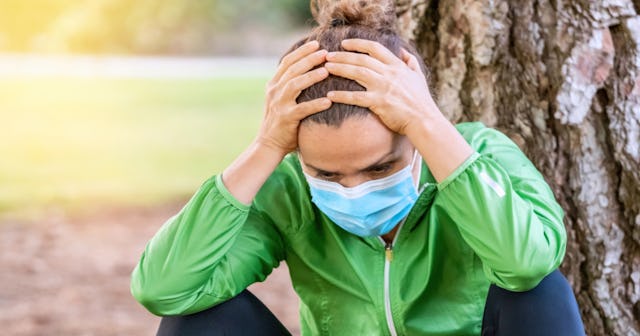Don't Freak — Reopening Anxiety Is Normal

I cry about it sometimes. “I don’t know if I want to go back,” I tell my husband. “I’m scared that when we can finally do things again, I won’t want to.” I have severe social anxiety; insulation from playdate encounters and awkward small talk has come as an unintended but welcome side effect of the pandemic. Reopening anxiety is real for me and many others who cope with different forms of anxiety: social anxiety, OCD, and even depression.
What if I’ve forgotten how to people? My ADHD already makes social encounters difficult; I have problems with conversational turn-taking and staying on topic. Has the pandemic has increased that difficulty? Even if it hasn’t, my worry’s enough to trigger serious reopening anxiety. Maybe I don’t want to go back, whispers some little voice. Maybe I’m glad to jettison uncomfortable small talk with other moms.
Reopening Anxiety Is Common
The New York Times says about half of us are worried about reopening, according to the American Psychological Association. We stress about returning to in-person interactions, to face-to-face meetings, to small talk. But a smaller subset of that half finds themselves very worried: they have severe anxiety, diagnosed or not; they have OCD; they’re simply introverted. That smaller subset may not have suffered as much under isolation as others.
I certainly haven’t.
I’ve missed a few friends. I’ve felt terrible for my children — probably the worst part — but I haven’t found myself desperate for human contact. I remain content to visit my friend Patrick’s garage about once a week, smoke cigarettes, and watch TV. Joey blasts into town about every two weeks and sits on my porch. I’m always happy to see them, and I do need to see them. But I haven’t missed parties, small talk, mom gatherings, or meeting new people.
For people with severe social anxiety, especially those who tend towards panic attacks, the pandemic, while difficult, may have been “a respite,” says The New York Times. We’re people who “find the everyday grind not only wearing, but emotionally unsettling.” We find it hard to people anyway. People-ing after a pandemic? That’s a tall order for many of us who’ve grown accustomed to our comfortable bubbles.
“I am very worried about many of my socially anxious patients,” Andrea Maikovich-Fong, a psychologist in Denver, told The New York Times.
There’s Plenty of Reopening Anxiety to Go Around
What are the guidelines for safe meetings after vaccinations? The CDC says my Moderna vaccine is 94.1% effective at preventing COVID-19. But my kids haven’t been vaccinated. Should I worry as much about distancing for their sakes if we go out and about? If we still have to wear masks and yell at Karens that six feet means six feet, what’s the point in leaving the house?
I was never a sanitizer. But COVID-19 has turned me into a borderline OCD sanitizer (like it has most of us). I find myself telling my kids not to touch things in public — constantly — and sanitizing them when they do. I open all doors with my sleeve. I use pencil tips to push call buttons. COVID-19 guidelines may only reinforce OCD tendencies.
How To Manage It
Psychologists tell us we need to socialize. To help with reopening anxiety, they recommend, according to VeryWell Mind, starting contact with a few close friends, outside, and to be sure all your conversation isn’t centered on the virus. They also recommend that we’re mindful about people we choose for socialization. Are they people who tend to allay our anxiety — like my garage and smoking buddy — or increase it, like mothers I’m forced to hang out with via playdates?
We also need to be mindful, says VeryWell Mind, that masks aren’t helping anyone with reopening anxiety. We can’t see people’s faces to read social cues as well. For those of us with difficulty reading social cues already, this can make a hard task nearly impossible. Moreover, masks only remind us of the pandemic, which can trigger anxiety, a vicious cycle.
Psycom recommends making a “game plan”: list out activities that make you anxious, and rate them from one to one hundred. Then pick something in the 30-50 range to do. You’re pushing yourself hard enough to feel an accomplishment, but not so much that you’re too daunted to do it.
Take things at your own comfort rate while reopening anxiety persists. You need to keep going, but you shouldn’t attend an equivalent of the office Christmas party right away. Start small and work your way up.
Those with a diagnosis, or who suspect they may have a clinical diagnosis, should keep close contact with their therapist or psychiatrist during reopening. Someone safe to talk to helps — either in a clinical setting or outside it.
And don’t be afraid to admit your feelings. I’m terrified to go back to some semblance of normalcy, and I don’t know if I want to. I like staying home in my bubble, but I know I need to leave it. I can admit that scared me — and admitting that is the first step towards beating my reopening anxiety.
This article was originally published on